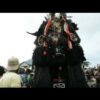Culture and Tradition
The Mystical Trees of Igboland: A Summary
In the heart of Igboland, four mystical trees stand as guardians of tradition and spirituality, each holding a unique significance in the cultural tapestry of the Igbo people.
Anunuebe: This mysterious tree, known for its forbidding presence and potent aura, offers healing through its botanical bounty, serving as a source of hope amidst the depths of the forest.
Akpụ Ọkarete: As the silent sentinel of Igbo history, Akpụ Ọkarete embodies resilience and endurance, offering a glimpse into the past while standing as a beacon of continuity in the present.
Oji, Oke Osisi (Iroko): Revered as the guardian of sacred groves, the Iroko tree stands as a silent witness to the passage of time, bridging the gap between the earthly realm and the realm of ancestors.
Oji (Kolanut): Symbolizing unity and hospitality, the sacred kolanut tree fosters bonds of kinship and solidarity, honoring the ancestral heritage with each shared lobe, from ancient rituals to contemporary gatherings.
In the rich vegetation of Igbo heritage, these mystical trees serve as living monuments to the reverence and resilience of a people rooted in tradition.
ANUNUEBE; THE MYSTICAL KING OF ALL TREES
INTRODUCTION
Anunuebe; the Igbo historical tree around which mysteries evolve. A tree that stands alone and makes a forest. The most powerful and fearful tree in Igboland. Anunuebe is a natural oracle. This epitome of Igbo mysticism, stands as a solitary sentinel amidst the lush forests of Igboland. Revered for its enigmatic nature and feared for its potent aura, Anunuebe commands reverence and respect from all who dwell in its shadow.
LEGEND AND ETYMOLOGY
The name “Anunuebe” derives from the Igbo words “Anunu” or “Nnunu,” meaning bird, and “Ebe,” signifying never perches. Legend has it that no bird dares to alight upon the branches of Anunuebe, for to do so would spell certain doom. This ominous moniker serves as a testament to the tree’s otherworldly power and allure.
This powerful tree grows deep in the forest, far from human settlements, because it is believed that any human or living thing that comes in contact with it dies instantly.
According to legend, this tree grows so large and spreads its leaves so widely that it casts large shadow around itself and it is said that no trees nor grass are able to grow under the shades of the Anunuebe tree.
Moreover, Anunuebe is rumored to possess an uncanny resistance to lightning strikes even when surrounding trees are affected, further cementing its status as a force beyond comprehension.
HEALTH BENEFITS
Despite its intimidating reputation, Anunuebe harbors a benevolent spirit within its gnarled roots. Native healers and spiritual practitioners venture into the depths of the forest to harvest its leaves, bark, and roots, harnessing their potent properties for medicinal purposes.
It is believed that the powerful spirit that dwells inside the tree moves out of the tree on very few occasions, for a mission. It is during this window, that powerful native doctors and healers visit the Anunuebe tree to harvest its leaves, barks, and roots for making powerful charms and cures for deadly diseases because the tree is less powerful at that point. These native doctors approach the tree with great caution, a live rooster in one hand and reciting incantations. Then the white rooster is thrown at the tree as a form of appeasement.
Some of the health benefits from this tree after its achieved are:
- Leaves and roots serve as cure for deadly diseases like Leprosy, Syphilis and Convulsion.
- Barks are used for preparation of potent charms.
- Leaves are used to fight against witchcraft.
- Leaves neutralizes potency of evil charms.
- Barks are widely used for preparation of powerful charms and potent amulets.
- Portions from the leaves are used traditionally to embalm dead bodies in the olden days. It helped in preserving corpses and it is believed to tame the spirit of the dead.
OJI, OKE OSISI (IROKO)
Oji, Oke Osisi, commonly known as the Iroko tree, stands as a venerable guardian within the sacred groves of Igboland. Revered for its longevity and spiritual significance, the Iroko tree holds sway over both the natural and supernatural realms. It has a very long-life span of up to 500 years. The name “OJI” in Igbo dialect is metaphoric for strength, nobility, resilience.
According to ancient lore, the Iroko tree is inhabited by the spirit of Iroko man, whose presence instills both awe and reverence. It is believed that gazing upon this ethereal guardian can lead to madness and misfortune, serving as a solemn warning against trespassing upon sacred ground.
It is also believed that any man who cuts down an Iroko tree for no cause brings devastating misfortune on himself and his family. Even if the tree needs to be cut down for some reasons, they would make prayers afterwards for protection.
There is also a claim that the spirit of the Iroko can be heard in the houses which use Iroko wood, as the spirit of the Iroko is trapped in the wood.
ECONOMIC IMPORTANCE
- Used in making stools, doors/gates, Ikolo, slit drums etc.
- Landmarking and boundaries.
- Dye production.
MEDICINAL IMPORTANCE
- The Iroko leaves, bark, milky latex and ashes are used for preparing herbal medicines to treat certain diseases like: Dysentery, Female sexual infertility, Cough and Cold, Asthma, Pile, Dysmenorrhea, Leprosy, Diabetes, Scabies, Heart problems etc.
- It also serves as aphrodisiac.
- The milky latex is used for treating skin burns, eczema, sores and other skin problems.
- It is believed that eating the leaves is capable of treating mental disorders.
OJI (KOLANUT)
The kolanut tree is a very popular tree in Igbo land that bears the special fruit of great significance called Oji. This tree is a well-respected tree in Igbo land and abhors harvesting, so one must wait for the fruit pod to fall to pick them. Women are also not allowed to pick the fruits. If a kolanut fruit falls off the tree, even if a male adult is not close by to pick it up, any male child nearby, would be instructed to do so. In Igbo land, it is widely believed that this tree does not have ownership, so its fruit belongs to everyone in the environs where it is planted.
The traditional oral history of the Igbos, claims that the Kolanut tree was the first tree to be planted on Earth by Chi-Ukwu and therefore its fruit, the first on Earth.
The Kolanut is among, if not the greatest symbol among the Igbos because it is central to the life and ceremonies of the Igbos. Kolanut is a symbol of Life, that is why the Igbo say, “He that brings Kola, brings Life”
From ancient rituals to modern-day gatherings, the offering of kolanut transcends mere sustenance, embodying the spirit of communal harmony and shared prosperity.
Kolanut is also the greatest symbol of Hospitality amongst the Igbos because once a household has a visitor, the first thing they present is a Kolanut.
In gatherings and ceremony, Kolanut is also presented as a symbol of togetherness, love and trust.
SIGNIFICANCE
Every kolanut can be broken into lobes and the number of these lobes has important significance:
- Kolanut with One Lobe: It is called Oji Ogbi (dumb kola). It is not eaten by humans. It is believed to belong to Chi-Ukwu because it is neither male nor female and Chi-Ukwu is one and indivisible in nature.
- Kolanut with Two Lobes: It is called Oji gworo/Oji kuru aka symbolizing male and female. It belongs to the spirits and is not used for religious and cultural celebration in Igbo land. However, it can be eaten after some prayers.
- Kolanut with Three Lobes: It is called Oji Ikenga (the spirit of power and achievement). It is a masculine Kola, eaten only by warriors and brave men. It is not eaten by women except for those seeking for a male child.
- Kolanut with Four Lobes: It is called Oji aka ano-the Kola of peace and blessings. It symbolizes completeness and represents the 4 market days (Eke, Orie, Afo, Nkwo). It is also called Oji Ezinauno because it is believed to unite family.
- Kolanut with 5 Lobes: Oji Omumu-It symbolizes protection, industry, progress and good luck. It is a sign that things will go well.
- Kolanut of 6 Lobes: Oji Ogbugbandu-It is the kolanut of communion or the kolanut of blood and spirit ties.
- Kolanut of 7 Lobes: It is known as the kolanut of perfection.
IMPORTANCE OF KOLANUT
- To welcome a visitor
- To open a prayer
- For rites, rituals, and ceremonies.
- Divination and Prophecy
- Worship
- Commerce
- Food and Nutrition
AKPU OKARETE: THE SILENT WITNESS OF TIME
INTRODUCTION
Akpu Okarete, the silent sentinel of Igbo history, standing tall amidst the ebb and flow of time. An embodiment of resilience and endurance, this ancient tree silently observes the passage of generations in Igboland.
LEGEND AND MYSTICISM
Legend has it that Akpu Okarete holds the whispers of ancestors within its bark, speaking volumes to those who listen closely. Its name, derived from “Akpu” meaning “mound” and “Okarete” referring to a type of yam, hints at its association with sustenance and abundance.
SPIRITUAL SIGNIFICANCE
Beyond its physical presence, Akpu Okarete holds profound spiritual significance. It is believed that the tree serves as a conduit between the earthly realm and the realm of ancestors, with its roots delving deep into the ancestral soil. It is also believed that it houses a spirit which embarks on fights for the oppressed and marginalized. The spirit also tenders solutions and provides favors to people with spiritual problems.
CULTURAL HERITAGE
Throughout history, Akpu Okarete has been a focal point of cultural ceremonies and rituals. From weddings to funerals, its shade provides solace and its presence lends a sense of continuity to the rituals that shape Igbo identity.
COMMUNITY GATHERINGS
Underneath the branches of Akpu Okarete, communities gather to share stories, resolve disputes, and celebrate milestones. Its sturdy trunk symbolizes the strength of communal bonds, while its sprawling canopy offers protection to all who seek refuge beneath it.
ENVIRONMENTAL STEWARDSHIP
As custodians of the land, the Igbo people recognize the importance of preserving Akpu Okarete and other sacred trees. Efforts are made to safeguard these natural treasures for future generations, ensuring that their legacy endures. In a rapidly changing world, Akpu Okarete remains a steadfast symbol of continuity and tradition. As we pay homage to this venerable tree, let us also reflect on the timeless wisdom it imparts, reminding us of our interconnectedness with the past, present, and future.
CONCLUSION
In the rich vegetation of Igbo culture, the mystical trees of Anunuebe, Akpụ Ọkarete, Iroko, and kolanut stand as living testaments to the enduring legacy of tradition and spirituality. As guardians of the land and harbingers of healing, these arboreal wonders inspire awe and reverence, weaving a narrative that transcends the boundaries of time and space.





























